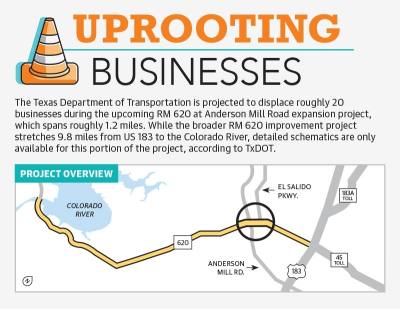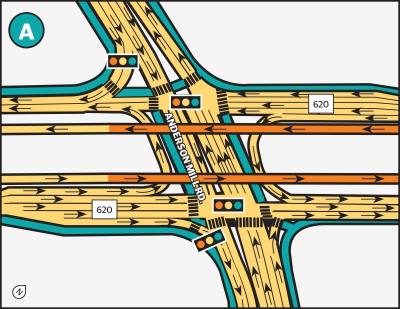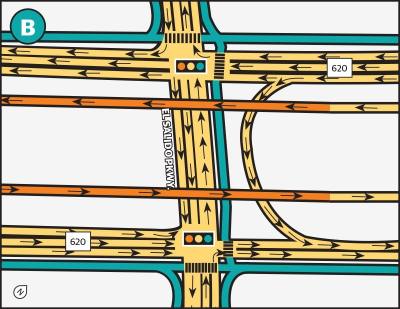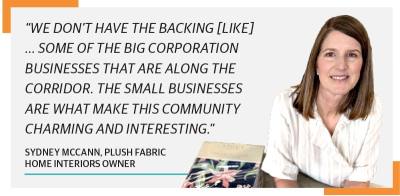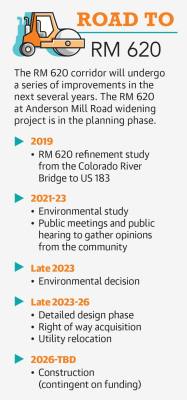“We don’t have the backing [like] ... some of the big corporation businesses that are along the corridor,” she said. “The small businesses are what make this community charming and interesting.”
Over the next several years, TxDOT is proposing to expand the RM 620 corridor, stretching from US 183 to the Colorado River Bridge near the Mansfield Dam, potentially wiping out several businesses along the way.
The entire scope of the RM 620 expansion project extends 9.8 miles. It is a four-lane undivided roadway with a continuous center-turn lane, but due to an increase in population, some portions of the corridor could need a minimum of 10 lanes, according to TxDOT.
The RM 620 at Anderson Mill Road project, which is in the planning stage, spans 1.2 miles from just south of Foundation Road to Little Elm Trail.
Based on TxDOT’s schematic map, multiple businesses in this stretch of road, including restaurants and establishments that have operated for more than a decade, will be in jeopardy of displacement. Others, such as Plush Fabric, which are located outside this 1.2-mile segment, have yet to learn if they will be relocated.
“All businesses ... need to keep their eyes and ears open to potential things that could happen in their world,” said Mel Kirkland, Cedar Park City Council member.
Tackling traffic congestion
In 2019, TxDOT conducted a refinement study on RM 620 from the Colorado River Bridge to US 183. It found commuters traveling on RM 620 experience major traffic-related delays during morning and afternoon peak travel times, which results in congestion, reduced safety and hindered mobility, according to TxDOT.
From Hwy. 71 in Bee Cave to US 183 in Austin, the RM 620 corridor handles 35,000-50,000 trips per day, which is well over TxDOT’s design standard for the road.
“The reason they’re widening [RM 620] is because this portion of Williamson County is growing by leaps and bounds,” Kirkland said. “Until this road is widened and made safer for people traveling through this area, it’s always going to be an issue and problem.”
Because Anderson Mill Road is one of the most-congested intersections on the corridor, the aim of this portion of the project is to enhance safety and improve mobility in the area.
This $38 million project will add frontage roads, elevated bypass lanes at the Anderson Mill Road and El Salido Parkway intersections, turnarounds at both intersections, additional right-turn lanes, and a shared-use bicycle and pedestrian path, according to TxDOT.
The RM 620 at Anderson Mill Road project is still early in the planning process. TxDOT Southwest Communications Director Brad Wheelis said as part of the environmental process, another public hearing is anticipated to take place in May. By the winter, TxDOT’s environmental decision is expected.
Then, TxDOT will begin detailed design, right of way acquisition and utility relocation, which are projected to take up to three years. Construction could follow soon after.
"Anytime you can improve the mobility and safety of a roadway, that’s a bonus,” Williamson County Commissioner Cynthia Long said. “It’s a benefit for the people that will be passing through, but it’s also going to be a benefit for the people who live and work in that area as well.”
However, as a result, about 20 businesses will be facing displacement from the RM 620 at Anderson Mill Road project alone, according to TxDOT.
Businesses in this 1.2 mile-stretch facing displacement include Nagoya Steak and Sushi, Dos Mary’s Tex-Mex Bar and Grill, VCA Lakeline Animal Hospital, Mr. Sharky’s Car Wash, and multiple others. TxDOT will be working on right of way acquisition over the next three years.
“The unfortunate part about any construction project like this is sometimes there are businesses or residences ... that the right of way may have to be acquired from them in order to make the project happen,” Long said. “It’s frustrating, and I know it’s incredibly disruptive for those businesses.”
Risk of displacement
Businesses outside of the RM 620 at Anderson Mill Road project could be in jeopardy of displacement later.
After having to relocate due to the Bell Boulevard realignment project, McCann settled Plush Fabric—which has been in business for 16 years—at 12332 N. RM 620, Austin. Cedar Park Mayor Jim Penniman-Morin said Plush Fabric may have to move again.
Due to a short notice ahead of her first move, McCann had to find a second location for Plush Fabric in under 90 days, which was expensive.
If Plush Fabric has to relocate again due to the RM 620 expansion project, McCann said this time, it has to be well planned and executed. Though McCann is not sure of her next location if displaced again, she said affordability and visibility would be the focus.
Though the expansion aims to tackle congestion along the corridor, McCann said she is not sure why so many lanes are needed. She said TxDOT could just take a small portion of the land rather than the whole building.
“As much as the community and the cities pay lip service to us being small businesses, I hope they stick up for us, too, and really help us in this situation—banding together and being vocal and making sure everybody affected gets a fair deal,” McCann said.
Stuffed Cajun Meat Market—which has been located at 12226 N. RM 620, Austin, for 13 years—is also in jeopardy of displacement. Owner Kurt Knies has been following the project for years.
“It’s progress; it’s coming; whether you like it or not, it’s going to happen,” he said. “It probably will displace us, and when that happens, ... we’ll have plenty of head start and relocate.”
Although there is not a lot he can do about the potential relocation, Knies said he will continue to attend stakeholder meetings and stay up to date on the project.
While Stuffed Cajun Meat Market and Plush Fabric Home Interiors have Austin addresses, they are considered Cedar Park businesses because of where they pay their taxes. Officials in Cedar Park said there are several places for these businesses to relocate within the city.
“If they’re going to lose their current location, there are a lot of other great business locations in Cedar Park that ... will provide them with a lot of growth opportunities as a business,” Penniman-Morin said.
Not relocating, but adjusting
Businesses not located directly in the right of way may be affected by construction-induced traffic and accessibility issues from the widening project.
Located behind Plush Fabric at 12332 N. RM 620, Bldg. C, Austin, Waterloo Swimming’s driveway could become a frontage road, General Partner Mike Varozza said, which may be too busy for customers.
“We would just want to make sure that [customers] have access to us in the best possible way,” he said.
Varozza said he will work with TxDOT on safety measures once the project advances to construction.
He said he is not necessarily worried about displacement because Waterloo Swimming has one of four Olympic-size pools in the Austin area.
“You can’t pick up two pools, an Olympic pool and a teaching pool, and move it,” Varozza said. “We’re not a retail shop where you just take your inventory and move it to another building.”
Located within the RM 620 at Anderson Mill Road project but off the roadway, Hill Country Bible Church is not in jeopardy of displacement. The church’s parking lot, however, will likely be on the access road.
Similar to Varozza, church leadership is also focusing on safety for its congregation and the student body at Hill Country Christian School of Austin.
“[The project] won’t directly impact us, but during the construction phase we’ll have ingress, egress issues,” Director of Facilities Randy Willard said.
Despite being affected by the expansion, both Waterloo Swimming and Hill Country Bible Church officials said they believe the project needs to happen.
“The traffic counts are getting worse as people move here, and you can’t stop progress; you really need to stay out in front of it,” Willard said. “People are moving here, and we’ve got to do it for the safety of all of us.”





